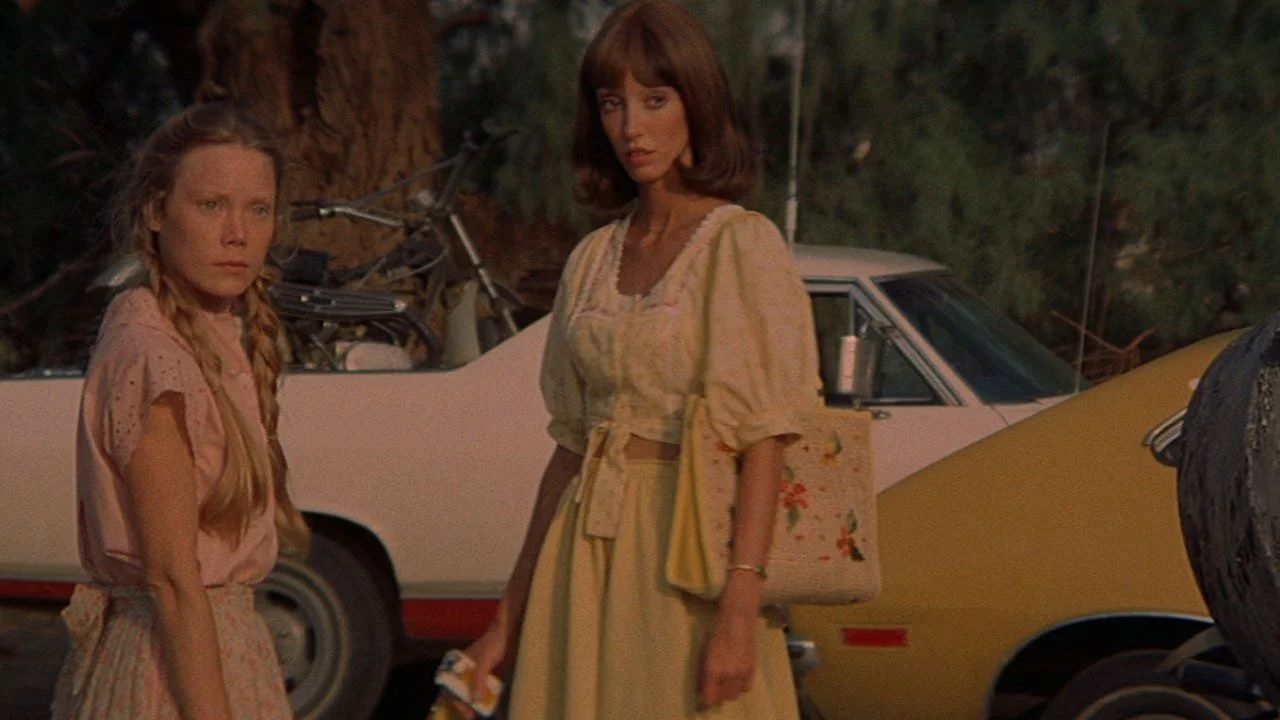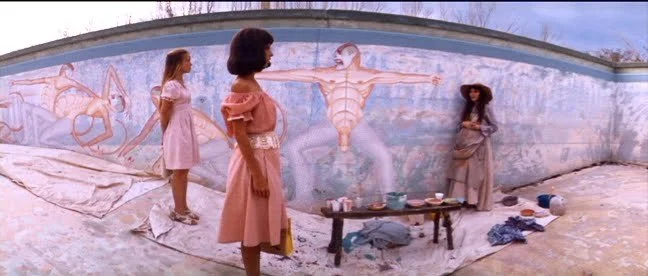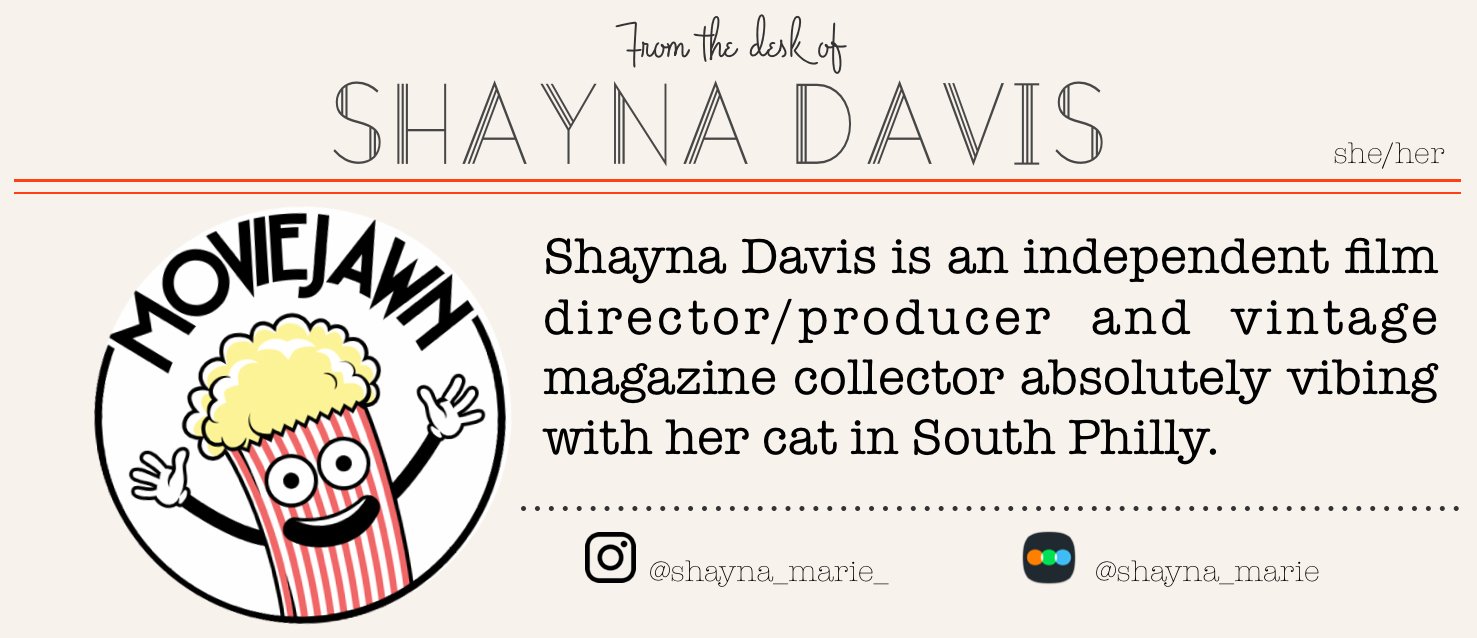New to Me 2024: Spending my 25th birthday with 3 WOMEN and remembering Shelley Duvall
by Shayna Davis, Staff Writer
In March of this year, I turned 25. I had no real feelings about this milestone. The only real thought I had about it was a memory of getting lunch with a friend the year prior. He was about to turn 25 at the time, and spent a good chunk of our lunch date lamenting over how old he was getting. I couldn’t help but think how twisted that viewpoint was. I did, and still do, feel much like a child shoved into an adult body with no operating instructions. Improvising as I go along, pulling from parental advice and what I took from lifestyle vloggers I watched as a teenager.
My 25th birthday was actually one of the best birthday’s I’ve had in a long time and it kicked off with a screening of Robert Altman’s 3 Women starring Janice Rule, Sissy Spacek, and personal role model of mine, Shelley Duvall. Despite my love for Duvall, I didn’t intend to watch this film for my birthday. I took a weekend trip to New York to finally check out the Museum of the Moving Image in Queens and 3 Women just happened to be the film they were screening that day. In hindsight, it was the perfect movie to watch for that occasion.
Released in 1977, 3 Women was director Robert Altman’s 13th feature film. Following on the success of topical hits like M*A*S*H and Nashville (which I also saw for the first time this year actually), 3 Women possesses a similar meandering quality and Altman’s touch of humanistic detail, but is tethered to no real sense of logic. The story follows Pinky (Sissy Spacek), newly planted in the California desert from Texas. She gets a job at a physical rehabilitation facility for older folks and is immediately enamored with her coworker Millie (Shelley Duvall). When Pinky moves in with Millie, their relationship reaches strange new levels. The third woman of the title is Willie (Janice Rule), a woman who co-owns the bar/shooting range Millie frequents as well as the apartment complex she and Pinky reside in with her sleazy, over-masculine husband, Edgar (Robert Fortier). Willie drifts around painting gorgeous, but violent, folk-art murals around the two properties and touting a prominent pregnancy bump.
According to the mythos, the idea for 3 Women came to Altman in a dream when his wife was in the hospital and he set out to capture the exact feeling. Because of that, 3 Women is a hard movie to pin down. Viewers love theorizing what different aspects of each woman and their interwoven dynamics are supposed to mean. It’s a true Rorschach test of a movie. My perspective on it may change over numerous years and viewings, but for me, at this age, I can’t see it as being about anything else but the different stages of adulthood, specifically for those raised as women.
Pinky represents childhood. She exists a bit in her own world and doesn’t care much about other people’s opinions. She’s clingy towards Millie and presents as shy, though she can’t help bringing a little chaos into any situation. She has no social tact, evident in a scene where she reveals that her birth name is Mildred, but she goes by Pinky because she thinks Mildred is an ugly name. Millie gets understandably upset at this and when Pinky asks why, Millie has to explain that her name is short for Mildred. To which Pinky responds with a slightly guilt-tinged “Oh.”
Millie represents young adulthood. She is Good Housekeeping personified. She puts all her effort into coming across composed, refined, and knowledgeable, when in reality, everyone but Pinky finds her borderline insufferable. She’s a burgeoning housewife at a time when being so is incredibly uncool, but she has no idea. However, this is exactly what draws Pinky to her. Pinky is the child who idealizes adulthood and Millie is seemingly everything traditional adulthood platforms for women: good fashion sense and hygiene, a put together home, good hostess skills, worldly facts to rattle off in conversation, and just enough tact to flirt with men without coming off as a slut.
Willie’s character is a little harder to pin down, but I believe she is actual adulthood personified. She comes across as unkempt, but beautiful regardless. She is always by herself, barely saying a word, channeling all of her inner emotions into her painting. She has no other women in her life. The only people in her orbit are Edgar and all the men who spend their time at the shooting range. She’s the product of being pushed towards marriage and motherhood without support. The three of them resist and gravitate towards each other whether they like it or not. Just as each of these life phases are unavoidable and coexist within you.
At this point in my life, it feels very easy to put myself in the shoes of both Millie and Pinky. Though most of my peers whine about “getting old” and “adulting,” being 25 is technically closer to being a child than it is to middle aged. I can still feel the child I once was kicking around in my body; when my first instinct is to call my mom anytime something remotely bad happens, the urge to throw a fit any time I get tired or hungry, acting clingy around my friends because I don’t want our time together to end. It’s a process I wasn’t ready for; having to learn to balance those reactions. On the flipside, I am the same age as Millie. There’s also that internal struggle of trying to figure out what kind of woman I want to be. The suave lady of the house or the cool sexually liberated young woman? Both would be nice. Millie brings up the fear that in figuring out who I want to be I’ll come across as annoying. I wanted to be an adult so bad as a kid, but now I’m here and I still don’t know what I want that to mean. Like Pinky and Millie though, I look on to legitimate adulthood, the Willies of the world, with a mix of fear and awe. I find pregnancy terrifying. I find the idea of committing to a man who turns on me terrifying. But wandering around doing my art undisturbed does sound incredible.
I would be remiss to wrap up this meditation on 3 Women without mentioning the passing of its star, Shelley Duvall, this past July. Shelley was, and still is, a huge inspiration to me and I’m grateful I found this film of hers when I did. 3 Women was a key moment in her career. This was the final film in her run of exclusively working under Altman’s direction. He convinced her to be an actress after meeting her at a party in 1970 and she was effectively his muse for much of his career after that. She made six films in a row with him from 1970–1977 before branching off. He saw something incredible in her and (mostly) used her to her full potential. 3 Women was really her moment though. Shooting with no script, Duvall was given nothing but a story treatment (written by Patricia Resnick) to work off of when developing the role of Millie. In Altman’s words:
“[Millie’s] diary entries in the film and her recipes and all that stuff—her shopping lists and the things that she did and talked about—her makeup, her lipstick, her fantasy about how the boys all were after her when obviously none of them wanted to get near her. That all came from [Shelley]. And that diary of hers is just terrific. I couldn’t have done it and I don’t know a writer who could have done it as well as Shelley did.”
3 Women marked the end of her Altman exclusive run, going on to a supporting role in Annie Hall and, of course, The Shining right after. This film also marked her first time being recognized for the force she was by the rest of the industry with her Best Actress win at Cannes. Crazily, the only award she ever won outside of 3 Women was a Peabody Award for her children’s TV creation Faerie Tale Theatre (which is a totally deserving masterpiece).
Though she’d been in and out of the spotlight for the last few decades, Shelley Duvall’s starpower remained bright ever since her debut some 60 years ago and it will continue to do so for many to come. I for one am very excited to continue discovering her work and revisiting what her films mean to me.





